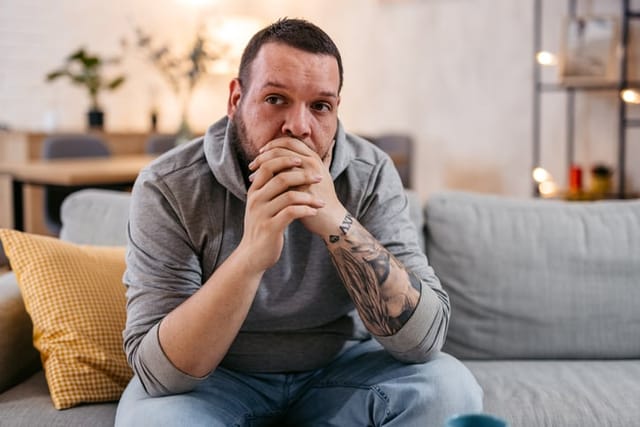1. They overreact to things that are really no big deal.

Seemingly minor triggers can lead to unexpectedly intense emotional reactions. This is because trauma can disrupt someone’s sense of safety, making them hyper-reactive to perceived threats. They might jump at loud noises, lash out in anger, or shut down emotionally. It’s important to remember their reaction isn’t about you, it’s about the unhealed wounds they carry.
2. They avoid their triggers at all costs.

They might go to great lengths to avoid specific places, people, or situations that subconsciously remind them of their trauma. These avoidance behaviors are an attempt to shield themselves from potential emotional pain. This avoidance can significantly restrict their lives. If you notice this pattern, gently encouraging them to seek help can be a supportive first step.
3. They’re emotionally numb.

To cope, they may emotionally shut down. They might seem detached, have difficulty connecting with others, or lack joy. Numbing their feelings becomes a way to avoid re-experiencing the pain of their trauma. It’s heartbreaking to see someone lose their spark, but understanding this is a survival mechanism can help you offer compassion.
4. They’re always on guard.

Trauma can leave someone in a constant state of hypervigilance. They might be easily startled, struggle to relax, or always scan their environment for potential threats. The world doesn’t feel like a safe place for them anymore. Extending patience and reassurance can go a long way in helping them feel less constantly on edge.
5. They get nightmares and flashbacks.

They may experience disturbing nightmares or intrusive flashbacks related to the traumatic event. These re-experiencing symptoms can feel terrifyingly real, as if the trauma is happening all over again. Offering emotional support during flashbacks – reassuring them of their safety in the present – may provide some comfort.
6. They struggle to trust people.

Trauma often erodes a person’s trust in other people. They may be terrified of betrayal, vulnerability, or getting hurt again. This can make forming healthy relationships extremely challenging. Respecting their boundaries and avoiding pushy behavior helps demonstrate that you’re a safe person in their life.
7. They have unexplained physical symptoms.

Trauma is stored in the body as well as the mind. They might experience unexplained aches, pains, digestive issues, or other physical symptoms that seem to have no medical cause. It’s their body screaming the pain they may not be able to articulate. Encouraging them to seek medical advice and a therapist specializing in trauma can help address both the physical and emotional impacts.
8. They self-sabotage for reasons they can’t explain.

Subconsciously, they might engage in self-destructive behaviors or undermine their own success. Deep down, they might not feel worthy of happiness or fear that things will inevitably go wrong again. These behaviors are a warped way of regaining a sense of control. Try not to take their self-sabotage personally, it’s their trauma talking, not their true self.
9. They struggle with concentration or memory.

Trauma can impact cognitive functioning. They may struggle to focus, experience memory lapses, or have difficulty recalling information related to the traumatic event. Their brain can become fragmented after experiencing extreme stress. Understanding these cognitive gaps are a symptom, not a character flaw, allows you to respond with greater empathy.
10. They show sudden changes in behavior.

If a usually outgoing person becomes withdrawn or a laid-back person becomes irritable, it might signal unresolved trauma. Unexplained shifts in personality or behaviors may indicate that they’re struggling to cope emotionally. Before jumping to judgment, consider the possibility that their change in behavior is a cry for help.
11. They experience insomnia or disturbed sleep.

Trauma can wreak havoc on sleep patterns. They might struggle to fall asleep due to racing thoughts, experience recurring nightmares, or wake up frequently feeling panicked. Fatigue can further exacerbate their emotional distress and overall well-being. Helping them create a calming bedtime routine might offer a small measure of comfort when sleep feels impossible.
12. They feel disconnected from themselves.

To cope, they may have dissociated during the traumatic event, feeling detached from their body or emotions. This dissociation can linger, leaving them feeling disconnected from their own sense of self. They may struggle to recognize their own wants and needs. Encouraging them to engage in mind-body practices like yoga or meditation can help them start to reconnect with themselves.
13. They start drinking or doing more drugs.

They might turn to alcohol or drugs as a way to numb their emotional pain and escape difficult thoughts and feelings. While offering temporary relief, substance use ultimately creates more problems and prevents true healing. Setting a compassionate but firm boundary around your own substance use in their presence might encourage them to re-evaluate theirs.
14. They experience intense fear or anxiety.
General anxiety, panic attacks, or specific phobias might be linked to past trauma. Their nervous system is in overdrive, constantly anticipating potential danger, even when no immediate threat exists. Learning relaxation techniques or seeking professional therapy can help them manage this hyperarousal.
15. They can’t regulate their emotions very well.
They might swing between emotional extremes – feeling numb one moment and flooded with uncontrollable anger or sadness the next. Trauma disrupts their ability to manage emotions healthily. Patience and understanding are vital when their emotional outbursts occur.
16. They dismiss their experiences.
They might minimize their trauma, saying “It wasn’t that bad” or “Others have it worse.” This is a way to avoid confronting the pain, and it prevents them from seeking the support they need. Gently validate their feelings by saying, “What happened to you sounds really difficult,” to counter their tendency to dismiss their own pain.
Enjoy this piece? Give it a like and follow Bolde on MSN for more!






